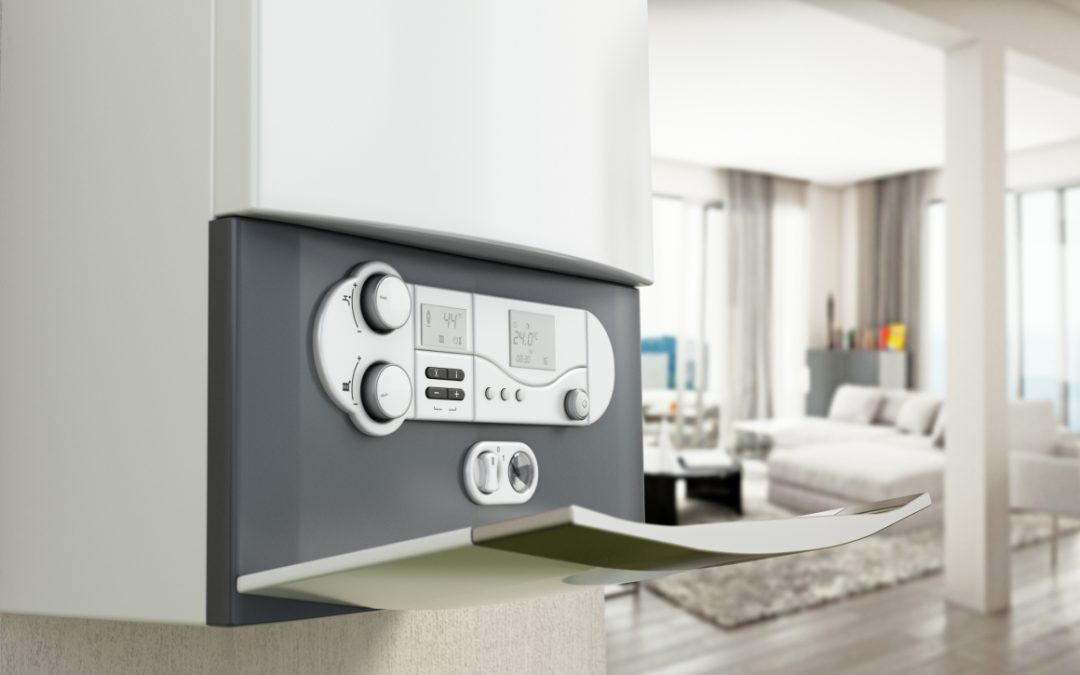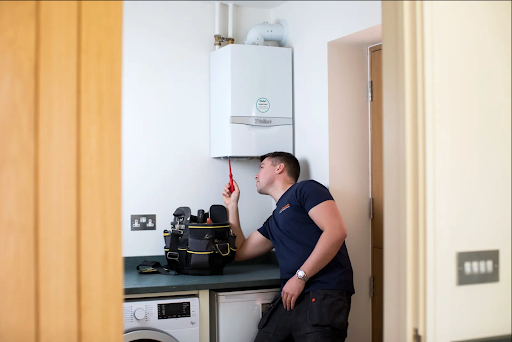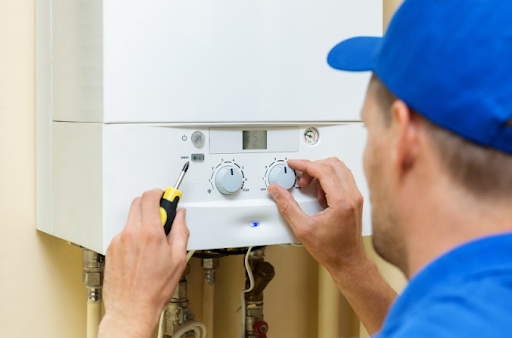When your boiler keeps turning off, it’s more than a short-term inconvenience. Each restart wastes energy, increases wear and hints at a deeper fault that could lead to costly repairs. For homeowners and facilities managers, understanding the warning signs early can save time and money, as well as disruption during the colder months.
This guide explains the most common causes, what you can safely check yourself and when to call a qualified engineer.
At Paine Manwaring, we keep heating systems reliable and efficient.
Book your service today to avoid unexpected winter breakdowns.
Why Does My Boiler Keep Turning Off?
If your boiler keeps turning off, it’s responding to a built-in safety mechanism. Modern boilers use sensors to monitor temperature, flow and pressure, automatically shutting down when levels fall outside safe limits.
Industry data shows that 22% of UK households skip their annual boiler service (MoneySuperMarket), which increases the likelihood of faults and energy waste. When a boiler turns itself off repeatedly, it’s trying to tell you something is wrong – often with pressure, flow or temperature control.
Common Causes for a Boiler Turning Off
Low Water Pressure
Low pressure is one of the most frequent reasons why a boiler turns off unexpectedly. If the pressure gauge reads below about 1 bar, the system can’t circulate water properly and will automatically switch off. Check the gauge – it should read 1–1.5 bar when cold. If topping up doesn’t help, there may be a leak or expansion vessel issue that needs professional attention.
Faulty Thermostat
A faulty or poorly positioned thermostat can misread room temperature, sending the wrong signal and causing the boiler to turn off early. If heating doesn’t match your settings, the thermostat may need recalibration or replacement.
Blocked Pipes or Sludge
A blockage in the system – often caused by sludge, limescale or trapped air – restricts water flow and triggers the boiler’s safety controls. Flushing the system can prevent future issues, but diagnosis should always be carried out by a qualified engineer.
Pump Failure
If the circulation pump isn’t running efficiently, water flow drops and the boiler overheats locally before it shuts down. Pumps can seize or slow with age. A sluggish or seized pump can’t circulate heat efficiently, so performance will continue to drop until the component is replaced.
Signs Your Boiler Needs Professional Help
A boiler will often show signs of distress before it fails completely. Recognising these early and calling a qualified engineer can prevent a costly breakdown or potential risks to safety. Common warning signs include:
- Frequent shutdowns or resets – the boiler turns off after a few minutes or needs restarting more than once a week.
- Unusual noises – banging, clunking or whistling can point to trapped air, limescale build-up or pump wear.
- Inconsistent heating – radiators warm unevenly, or hot water runs hot then cold, showing circulation faults.
- Error codes or flashing lights – these show control or sensor faults.
- Visible leaks or damp patches – signs of water escaping around joints or valves.
“Our engineers service and repair hundreds of domestic and commercial boilers every year, so we know the signs that lead to early breakdown. When a boiler cuts out repeatedly, it’s not something to ignore. It’s the system’s way of signalling that something isn’t right – often a circulation, pressure or control issue. Early inspection by a qualified engineer prevents small problems from turning into expensive breakdowns and helps keep your heating running safely and efficiently.”
– Adam Doick, Director at Paine Manwaring.
If you notice any of these issues, don’t try to investigate further. Never remove the boiler casing or front panel, as this can void your warranty and is unsafe unless you’re Gas Safe registered.
Boiler Short Cycling and Frequent On/Off Issues
If your boiler keeps turning on and off, it may be short cycling. This stop–start pattern increases wear on key components and wastes fuel.
What Is Boiler Short Cycling?
Boiler short cycling happens when your boiler heats water too quickly or receives incorrect signals from its sensors. Instead of running a normal 10–15 minute cycle, it shuts down prematurely and restarts within minutes. This constant on–off sequence uses more energy and shortens component lifespan.
Is Boiler Short Cycling Dangerous?
Short cycling itself isn’t immediately dangerous, but it indicates an underlying control or circulation fault that can worsen if ignored. Overheating, failed pumps or faulty sensors can cause pressure fluctuations – and if these go unchecked, they can lead to leaks or full shutdowns.
How to Prevent Short Cycling
You can’t always fix short cycling by yourself, but you can reduce the risk by ensuring your system is running correctly:
- Check the boiler size – if it’s too large for your property, it reaches target temperature too quickly and turns off early. A qualified engineer can confirm whether it’s correctly specified.
- Inspect thermostats and sensors – inaccurate sensors may cause the boiler to misread temperature.
- Maintain good water flow – airlocks, sludge or closed radiator valves restrict circulation and make the boiler cycle on and off.
- Book annual servicing – professional maintenance checks controls, sensors and combustion performance to prevent recurring short cycles.
Boiler Keeps Cutting Out
If your boiler keeps cutting out, it’s usually due to overheating or poor circulation. These safety shutdowns protect your system but should never be ignored.
Overheating Issues
A boiler overheating and cutting out may result from restricted flow, failed pumps or blocked radiators. Modern boilers include sensors and limit thermostats to prevent overheating, but if these triggers activate regularly, an engineer should investigate the cause.
Pump, Sensor and Pressure Problems
Faulty pumps or sensors can cause a boiler to cut out when central heating is calling for heat. Likewise, pressure sensors that misread levels may make the boiler switch off even when water flow is normal. If you’ve already topped up the pressure and the problem continues, it’s time for a professional inspection.
Hot Water Keeps Going Cold
If your hot water keeps going cold, or your combi boiler hot water goes cold then hot again, it’s likely a problem with internal valves or sensors rather than the taps or pipes.
Common Causes of Cold Hot Water
- Diverter valve faults: A sticking valve can prevent proper flow between heating and hot water.
- Plate heat exchanger issues: Scale or debris restricts heat transfer, causing the water to go hot and cold.
- Flow sensor problems: If the sensor fails to detect flow, the boiler turns off too soon.
How to Fix Hot Water Fluctuations
- Bleed radiators to remove trapped air.
- Check boiler pressure – always aim for 1–1.5 bar when cold.
- Call a Gas Safe engineer if the problem persists.
Combi Boiler-Specific Problems
Combi boilers are efficient and compact, but they rely on precise internal controls. If your combi boiler keeps turning off or short cycling, it often points to diverter valve, pressure or flow sensor faults.
Diverter Valve and Pressure Issues
The diverter valve directs water between heating and hot water circuits. If it sticks, the boiler may turn off after a few minutes or alternate rapidly between modes. Maintaining correct system pressure and ensuring valves operate freely prevents most faults.
Regular Maintenance Tips
- Annual service: Required by most manufacturers and the Gas Safe Register, this keeps your warranty valid.
- System checks: Monitor pressure, listen for new noises and ensure radiators heat evenly.
- Avoid DIY repairs: Removing panels or over-topping pressure can damage components and void guarantees.
- Prevent short cycling: Ask your engineer to confirm your boiler’s settings match your property’s heating demand.
Other Common Boiler Issues
Some causes of a boiler turning itself off aren’t mechanical at all. Electrical or gas interruptions can trigger the same symptoms:
- Tripping breakers or blown fuses – even modern boilers can shut down if there’s a short circuit caused by moisture or worn wiring.
- Ignition faults – modern boilers can struggle to fire up if the electrode or gas valve starts to fail, causing intermittent shutdowns or lockouts.
- Low gas pressure – common during high-demand winter periods when supply fluctuates.
Frequent tripping is rarely random – it points to an electrical or gas supply issue that should be investigated to prevent recurring shutdowns.
When to Call a Professional
A boiler that keeps turning off is a sign that something in the system isn’t working as it should.
Some boiler issues can be monitored briefly, but repeated faults should never be ignored. Call a qualified engineer if:
- The boiler turns off after a few minutes more than once
- Pressure keeps dropping despite topping up
- Hot water or heating is inconsistent
- You see leaks, error codes or hear unusual noises
- You smell gas or suspect a safety concern
Occasional resets can happen, but if it shuts down repeatedly, it’s time to involve a qualified engineer. Leaving faults unresolved increases energy use and the risk of full breakdowns. Regular servicing is the simplest way to keep your boiler safe, efficient and ready for colder months.
At Paine Manwaring, our engineers service and repair all major boiler types, including combi, system and conventional, ensuring every system runs safely and efficiently.
Book your annual boiler service today with our Gas Safe registered team.
Frequently Asked Questions
How can I stop boiler short cycling?
Check that radiator valves are fully open and system pressure is stable. Short cycling often points to incorrect boiler sizing or control settings, which should be reviewed during servicing.
How do I know if my boiler has an airlock?
An airlock traps air in the system, reducing water flow. Signs include gurgling sounds, radiators that stay cold at the top or the boiler turning off unexpectedly. Bleeding radiators can usually resolve it.
Why does my combi boiler keep tripping out?
A combi boiler that keeps tripping may have a faulty sensor, diverter valve issue or electrical fault. Repeated tripping isn’t normal and should be checked by a Gas Safe registered engineer.
Why does my hot water keep going cold on a combi boiler?
If the hot water goes cold then hot again, the diverter valve or plate heat exchanger could be struggling to maintain flow and temperature. Limescale and debris are common causes, particularly in hard water areas.
Paine Manwaring is an established, professional and highly experienced supplier of plumbing, heating and electrical services to domestic and commercial customers throughout Sussex, Surrey and Hampshire.
For more information about our heating, plumbing and electrical services which we provide for both homes and businesses, get in touch with a member of our expert and friendly team today on 01903 237522 or enquiries@painemanwaring.co.uk (Worthing) or 01243 784711 or info@painemanwaring.co.uk (Chichester).




